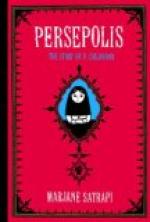“MY DEAR LITTLE MAMA,—I was truly happy to hear that you were all well. We are surrounded with measles at present on every side, for the Herons got it, and Isabella Heron was near Death’s Door, and one night her father lifted her out of bed, and she fell down as they thought lifeless. Mr. Heron said, ‘That lassie’s deed noo,’—’I’m no deed yet.’ She then threw up a big worm nine inches and a half long. I have begun dancing, but am not very fond of it, for the boys strikes and mocks me.—I have been another night at the dancing; I like it better. I will write to you as often as I can; but I am afraid not every week. I long for you with the longings of a child to embrace you,—to fold you in my arms. I respect you with all the respect due to a mother. You dont know how I love you. So I shall remain, your loving child,—M. FLEMING.”
What rich involution of love in the words marked!
Here are some lines to her beloved Isabella, in July,
1811:—
“There is a thing that I do
want,—
With you these beauteous walks
to haunt;
We would be happy if you would
Try to come over if you could.
Then I would all quite happy
be
Now and for all eternity.
My mother is so very sweet,
And checks my appetite to eat;
My father shows us what to
do;
But O I’m sure that
I want you.
I have no more of poetry;
O Isa do remember me,
And try to love your Marjory.”
In a letter from “Isa” to
“Miss
Muff Maidie Marjory Fleming,
favored by Rare Rear-Admiral
Fleming,”
she says: “I long much to see you, and talk over all our old stories together, and to hear you read and repeat. I am pining for my old friend Cesario, and poor Lear, and wicked Richard. How is the dear Multiplication table going on? Are you still as much attached to 9 times 9 as you used to be?”
But this dainty, bright thing is about to flee,—to come “quick to confusion.” The measles she writes of seized her, and she died on the 19th of December, 1811. The day before her death, Sunday, she sat up in bed, worn and thin, her eye gleaming as with the light of a coming world, and with a tremulous, old voice repeated the following lines by Burns,—heavy with the shadow of death, and lit with the fantasy of the judgment-seat,—the publican’s prayer in paraphrase:—
“Why am I loth to leave this
earthly scene?
Have I so found
it full of pleasing charms?—
Some drops of joy, with draughts
of ill between,
Some gleams of
sunshine ’mid renewing storms?
Is it departing
pangs my soul alarms?
Or Death’s unlovely,
dreary, dark abode?
For guilt, for
GUILT, my terrors are in arms;
I tremble to approach an angry
God,
And justly smart beneath his sin-avenging
rod.




